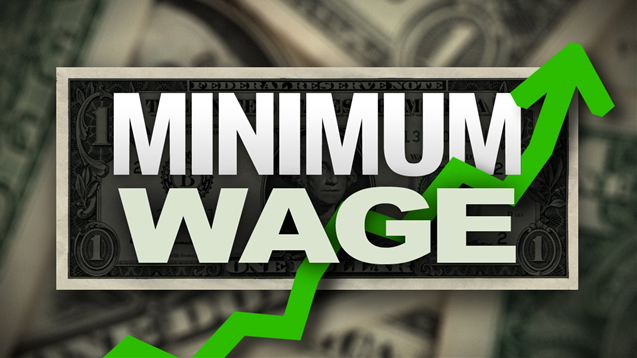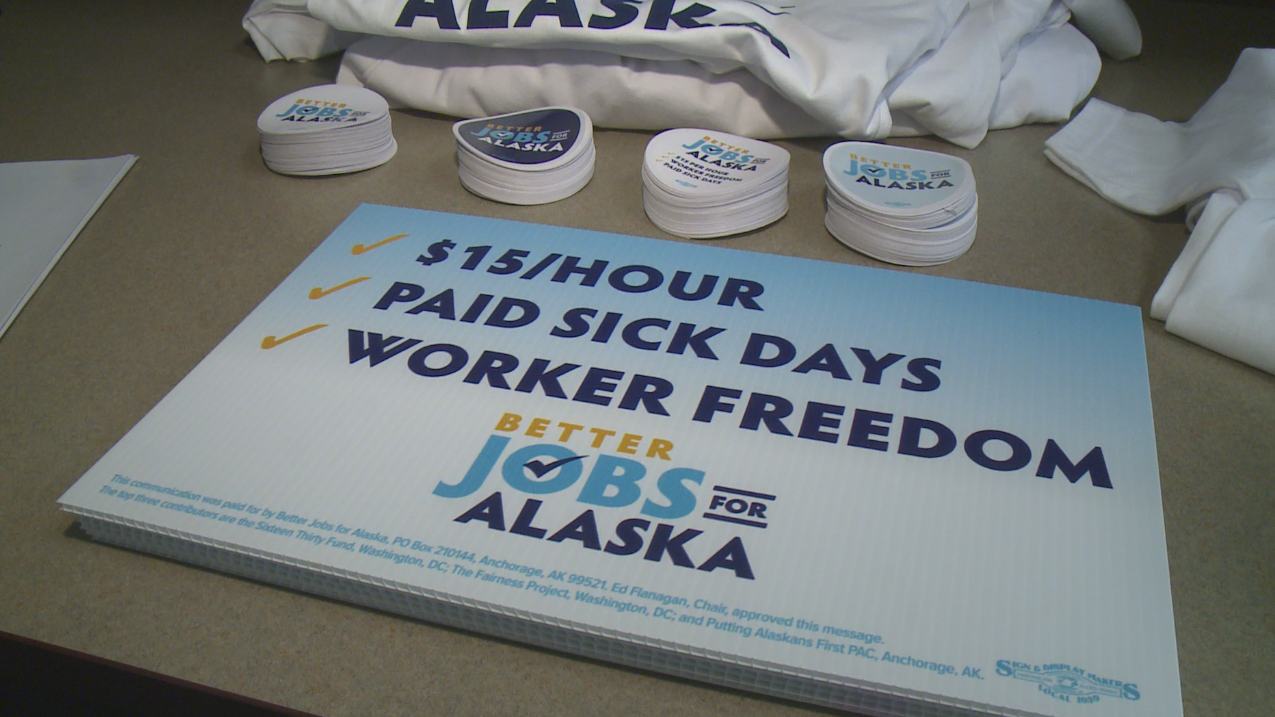Twenty states nationwide are increasing their minimum wage rates starting January 1, 2025. Many of these increases are due to the 3.18% increase in the Consumer Price Index for Urban Wage Earners and Clerical Workers (CPI-W). In addition, several municipalities are increasing their minimum wage. Here is a list of those changes:
Alaska minimum wage increases are based on the Consumer Price Index for urban consumers in the Anchorage metropolitan area (Anchorage CPI-U) for the preceding calendar year. The minimum wage starting January 1 is $11.91/hour. There is no separate rate for tipped employees.
However, Alaska passed Ballot Measure 1, which increases the state minimum wage to $13/hour starting July 1, 2025, $14/hour on July 1, 2026, and $15/hour on July 1, 2027. Ballot Measure 1 also enacts Paid Sick Leave.
The minimum wage increases to $14.70/hour and $11.70 for tipped workers. Proposition 212 would have increased the minimum wage to $18/hour and increased the minimum wage based on inflation measured by the Consumer Price Index. However, court challenges on whether enough valid signatures were submitted withheld the proposition from being on last November’s ballot. Expect this proposition to come up again in 2025.
Flagstaff’s minimum wage will be $17.85/hour for all workers and $16.85/hour for tipped workers. The Consumer Price Index will determine future minimum wage increases for most employees. Starting in 2026, tipped workers will have the same minimum wage as all other workers.
Tuscon passed Proposition 206, which increased the minimum wage to $15/hour starting January 1, 2025.
The new state minimum wage is $16.50/hour. California Proposition 32 surprisingly did not pass, which would have immediately raised the minimum wage to $17/hour and $18/hour on January 1, 2025.
Cites
Several cities and counties in California are increasing their minimum wage effective January 1, 2025.
- Belmont – $18.30/hour
- Burlingame – $17.43/hour
- Cupertino – $18.20/hour
- Daly City – $17.07/hour
- East Palo Alto – $17.45/hour
- El Cerrito – $18.34/hour
- Foster City – $17.39/hour
- Half Moon Bay – $17.47/hour
- Hayward – $17.36/hour (large employers, 26 or more employees); CA state minimum wage of $16.50/hour (small employers, 25 or fewer employees)
- Los Altos – $18.20/hour
- Menlo Park – $17.10/hour
- Mountain View – $19.20/hour
- Novato – $17.27/hour (100 or more employees); $17/hour (large, 26-99 employees); $16.42/hour (small, 1-25 employees)
- Oakland – $16.89/hour; $18.36/hour (hotel workers with health benefits); $24.48/hour (hotel workers without health benefits)
- Palo Alto – $18.20/hour
- Petaluma – $17.97/hour
- Redwood City – $18.20/hour
- Richmond – $17.77/hour
- San Carlos – $17.32/hour
- San Diego – $17.25/hour
- San Jose – $17.55/hour
- San Mateo – $17.95/hour
- San Mateo County (Unincorporated) – $17.46/hour
- Santa Clara – $18.20/hour
- Santa Rosa – $17.87/hour
- Sonoma – $18.02/hour (large employers, 26 or more employees); $16.96/hour (small employers, 25 or fewer employees)
- South San Francisco – $17.70/hour
- Sunnyvale – $19.00/hour
- West Hollywood – $19.65/hour for non-hotel workers
California fast-food workers have a minimum wage of $20/hour that started April 1, 2024. The annual wage increase is capped at the lesser of 3.5% or the annual increase in the US-CPI for Urban Wage Earners and Clerical Workers. Expect an announcement of an increase in April 2025.
The Los Angeles City Council recently passed a Living Wage Ordinance for Hotel and Airport Workers that starts February 1, 2025. It raises hotel workers’ wages from $19.73/hour and airport workers’ wages from $18.78/hour to $25/hour. This ordinance includes an additional $$7.51/hour for Hotel workers and $8.35/hour for health benefits. Hotel workers in LA currently do not have credit for health benefits. The ordinance also includes $1/hour raises until the minimum wage is $30/hour in 2028.
The minimum wage is $14.81/hour, $11.79/hour for tipped workers with tip credit.
In addition, the minimum wage in Denver is $18.81/hour, and $15.79 is for tipped workers with tip credit.
Edgewater began a minimum wage increase progression chart. Beginning January 1, 2025, the minimum wage is $16.52/hour. The rate will go to $21.99 by 2028.
Boulder County passed a new minimum wage ordinance to reach $25/hour by 2030. Starting January 1, 2025, the minimum wage is $16.57/hour. In addition, Boulder County employers of food and beverage workers can take a tip credit of up to $3.02.
The city of Boulder recently passed an ordinance gradually increasing the minimum wage to $18.17/hour by 2027. The rate will be $15.57/hour starting January 1, 2025.
Starting January 1, 2025, Connecticut’s minimum wage will indexed to the Federal Employment Cost Index (ECI). This index is a quarterly economic series that measures the change in the price of labor, defined as compensation per employee hour worked, in the United States. This amount increased by 4.2% from June 2023 to June 2025.
The minimum wage increases to $16.35/hour.
Senate Bill 15, signed into law on July 21, 2022, moves the minimum wage to $15/hour starting January 1, 2025. Tipped employees are still at the federal rate of $2.23/hour.
Illinois finalizes its minimum wage increase schedule, going to $15/hour and $9.00/hour for tipped workers on January 1, 2025.
The minimum wage is $14.65/hour, $7.33/hour for tipped workers.
Portland increases its minimum wage to $15.50/hour or $7.75/hour for employees who earn over $175 monthly in tips.
Rockland also increases its minimum wage to $15.50/hour and $7.75/hour for service employees.
Howard County raises its minimum wage to $16/hour for businesses with 15 or more employees.
Michigan’s minimum wage will increase twice in 2025. The first increase will occur on January 1, 2025, following the usual rate increase schedule, and the second will occur on February 21, 2025, per the recent Michigan Supreme Court ruling regarding the Improved Workforce Opportunity Wage Act (IWOWA).
The minimum wage will increase to $10.56/hour on January 1, 2025, and the rate for tipped employees will increase to $4.01/hour.
The minimum wage will increase to $12.48/hour on February 21, 2025. A tipped employee’s minimum hourly wage rate will be 48% of this rate, or $5.99/hour. This percentage will increase over the next six years until it reaches 100%.
Minnesota’s minimum wage rates are tied to employers’ gross receipts. Companies with $500,000 or more are considered large, while those with less than $500,000 are considered small.
In 2025, minimum wage rates in Minnesota are $11.13/hour (large employers) and $9.08/hour (small employers).
Minneapolis – All employers’ new minimum hourly wage is $15.97/hour.
St. Paul – minimum wage laws changes:
- Macro Employers (10,001 or more employees) – $15.97/hour
- Large Employers (101 – 10,000 employees) – $15.97/hour
- Small Employers (6 – 100 employees) – $14.00/hour
- Micro Employers (5 employees or fewer) – $12.25/hour
The Small and Micro Employers’ wage will increase by $1/hour on July 1, 2025.
On November 5, Missouri voters approved Proposition A to increase the state’s minimum wage. A minimum wage of $13.75/hour will take effect on January 1, 2025, and a minimum wage of $15.00 per hour will take effect on January 1, 2026. After that, all future annual adjustments to the minimum wage will be based on the Consumer Price Index.
The minimum wage for all employees increases to $10.55/hour based on the CPI. In Montana, tip credit, training wage, and meal credit are prohibited.
Nebraska approved a ballot measure to increase the minimum wage to $15/hour by 2026. The third increase sets the minimum wage at $13.50/hour, or $2.13/hour for tipped workers (the federal standard).
New Jersey’s minimum wage rates are as follows:
- $15.49/hour (large employers, six or more employees)
- $14.53/hour (seasonal and small employers with five or fewer employees)
- $13.40/hour for those who work on a farm for an hourly or piece rate
- $18.49/hour for long-term care facility direct care staff
- $5.62/hour for tipped employees with a tip credit of $9.87
Las Cruces enacted an ordinance in 2020 to increase the minimum wage by the CPI starting in 2025. In 2025, the minimum wage is $12.65/hour.
New York state minimum wage changes to $15.50/hour on January 1, 2025.
Nassau, Suffolk, Winchester counties, and New York City have increased their minimum wage to $16.50/hour.
In addition to this increase, recent amendments to the Labor Law provide further increases of $0.50/hour on January 1, 2026. The minimum wage will increase according to the CPI in 2027.
Ohio’s minimum wage rates are tied to employers’ gross receipts. Employers with gross receipts of $372,000 or more must pay a minimum wage of $10.70/hour. Companies with less than $372,000 in gross receipts pay the federal minimum wage of $7.25/hour. Tipped workers earn $5.35/hour.
Rhode Island passed legislation to increase the minimum wage to $15/hour starting January 1, 2025. The tipped credit for hourly workers in restaurants and hotels is $3.89/hour.
The minimum wage is $11.50/hour, and the minimum wage is $5.75/hour for tipped workers (half the minimum wage).
The minimum wage is $14.01/hour, $7.01/hour for tipped workers.
The minimum wage is $16.66/hour, the country’s highest state minimum wage.
Bellingham – As a result of a voter-approved ballot measure, on May 1, 2025, the minimum wage will be $2 above the state minimum wage. The $2 threshold will continue to adjust with state minimum wage changes starting January 1, 2026. This results in the minimum wage being $18.66/hour.
Burien – The Burien City Council approved Ordinance No. 855, which will increase the minimum wage starting January 1, 2025.
The new minimum wages in Burien are:
- Large Employers (those that employ more than 500 employees in King County or are franchisors who employ more than 500 in aggregate) – $4.50/hour over the state minimum wage or $21.16/hour.
- Mid-size Employers (those that employ 21-499 employees in King County or are franchisors): $3.50/hour over the state minimum wage or $19.16/hour. This rate starts on July 1, 2025.
Everett – Passed Initiative 24-01 that increases the minimum wage to $20.24/hour for employers over 500 employees worldwide and $18.24 for those with 15-500 employees starting July 1, 2025.
New minimum wage requirements for those in Unincorporated King County:
- More than 500 employees – $20.29/hour
- 16-500 employees – 18.29/hour
- 15 Employees or less and annual revenues $2 million or more – $18.29/hour
- 15 Employees or less and annual revenues less than $2 million – $17.29/hour
The new minimum wages in Renton, starting January 1, 2025, are:
- Large Employers (more than 500 employees worldwide, and all franchisees associated with a franchisor or a network of franchises with franchisees that employ more than 500 employees in aggregate) – $20.90/hour
- Mid-size Employers (at least 15 employees regardless of where those employees are employed or have annual gross revenue over $2 million) – $18.90/hour. Increases to $19.90 on July 1, 2025
Seattle – $20.76/hour for all employers
SeaTac – $20.17/hour for hospitality and transportation industry employers.
Tukwila – Tukwila passed a new tiered minimum wage.
The new minimum wages in Tukwila, starting January 1, 2025, are:
- Large Employers (more than 500 employees worldwide, and all franchisees associated with a franchisor or a network of franchises with franchisees that employ more than 500 employees in aggregate) – $21.10/hour
- Mid-size Employers (at least 15 employees regardless of where those employees are employed or have annual gross revenue over $2 million) – $20.10/hour.
Employers with less than 15 employees pay at the state minimum wage. The Mid-Size Employer rate will go to $21.10/hour starting July 1, 2025.
What to do next
If your company is affected by minimum wage changes, notify your workforce management and payroll company as soon as possible. These laws affect payroll, reporting, and forecasting. If you need help, please contact Time Equipment Company at sales@timeequipment.com or 800-997-8463.
*This information simplifies complex Acts as it is understood by Time Equipment Company. It is not to be taken as legal advice. The regulations for this program are changing. For further information contact your state or local Department of Labor.










